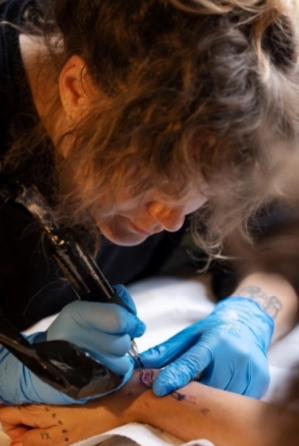
In the Mexican state of Nuevo León, local congresswoman Paola Linares of the Citizens' Movement party presented a bill in the state Congress to prohibit minors from getting tattoos, receiving micropigmentation, or body piercings—even with parental or guardian consent.
The reform seeks to eliminate all exceptions, establishing a total ban for minors. Currently, the law allows minors to undergo these procedures if accompanied by an adult with a signed document.
The proposal aims to amend the State Health Law and the Law on the Rights of Girls, Boys, and Adolescents, with the goal of protecting the health of minors and establishing stricter sanitary control over establishments offering such services.
Linares stated that the initiative intends to safeguard children’s right to health by ensuring they take a more active role in decisions involving permanent or high-risk body modifications once they reach legal adulthood.
The initiative will be reviewed in committee before being voted on in the full local Congress. If approved, it would set a significant precedent in the health regulation of aesthetic and body modification procedures.
However, the initiative has sparked reactions from various sectors of society, including the Christian community.

For Pastor Rigoberto Castro Miranda, a member of the pastoral team at the City of Refuge congregation in Monterrey, the cultural and family context of each person must be considered.
“Due to my ministry, I’ve had the opportunity to interact with hundreds of young people, both from inside and outside the church. My advice is not to do it, but if they show up with a new tattoo, I definitely wouldn’t condemn them,” Castro said.
In his view, adolescence is a stage when young people must learn boundaries from their parents and later face the consequences of their decisions as adults.
“My advice to parents of teens who want a tattoo is to ask why they want it. Very likely, they’ll find reasons tied to self-esteem, confidence, and acceptance, which can be addressed without altering their bodies,” Castro emphasized.
He also pointed out that an ideal response when a child asks for a tattoo is: “Let’s get informed first and talk about it.”
Tattoo popularity has surged in recent decades. Health experts agree that tattoo ink often contains carcinogenic chemicals, such as aromatic hydrocarbons and metals.
According to studies from the Swedish Council for Health Research, exposure to tattoos is associated with a higher risk of malignant lymphoma—a type of cancer originating in the lymphatic system, a vital part of the body's immune system.
There are also risks including infections, allergic reactions, healing problems, and psychological issues like low self-esteem or future regret.
According to family doctor David Morales Sainz, the risks that can result from tattooing a minor's body are significant.
“Both tattoos and piercings, if done without proper hygienic conditions using contaminated needles, can lead to severe bacterial or viral infections (like hepatitis B and C) or even HIV,” Morales warned.
He added that both tattoo ink and piercing materials can cause allergic reactions in some people.
“Tongue piercings can damage teeth, and some of them may lead to long-term problems like recurring infections or chronic irritation,” Morales said.
From the perspective of psychologist Raúl Andrade Covarrubias, teenagers tend to be impulsive, which can lead to lasting consequences.
“The biggest fear among families is when teens want a tattoo because they’re in love. The problem comes later when the relationship ends, and they don’t know what to do with the image or text they got,” Andrade noted.
The psychologist emphasized that young people, during their development, seek to “find themselves,” and during this phase of life, they often express a search for identity accompanied by sudden changes and a desire for new experiences.
One factor the mental health specialist highlighted is the influence of wanting to imitate celebrities or athletes during adolescence.
“Becoming obsessed with looking like a popular artist or football player, due to constant media exposure, has undoubtedly led young people to see them as role models in every way—something that isn’t always positive,” Andrade said.
According to figures from Mexico’s National Council to Prevent Discrimination, one in every ten people in the country has a tattoo. That’s around 12 million Mexicans, making the country number one in Latin America in this practice and its related spending.
Based on reporting by Diario Cristiano, Christian Daily International's Spanish edition.





